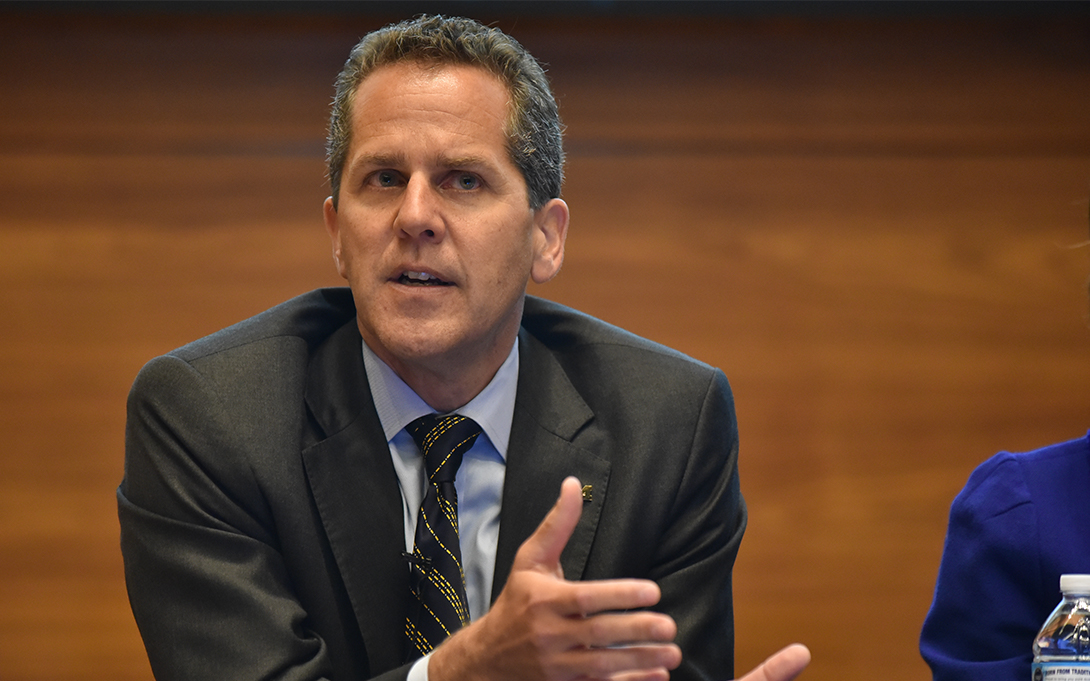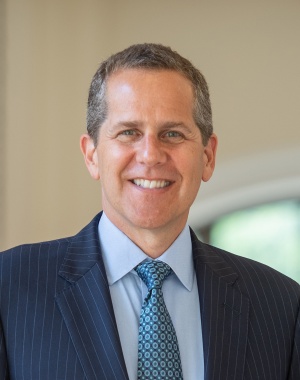
Throughout his career in academia and in government, Ford School Dean Michael S. Barr has sought ways to help low-income people get better access to the financial system, and to change the financial system to work better for low-income households.
Barr says, “Individuals and small businesses in low income areas can be subject to high-interest loans, limited access to investment, or barriers to receiving government assistance. These problems contribute to the Black-white wealth gap and make our national economy less innovative and weaker. These communities, often areas with a majority of people of color, have been suffering disproportionately during the economic downturn caused by the COVID-19 pandemic, so protecting and empowering them is even more urgent.”
“We need a safer and fairer financial system that works better for everyone. Financial inclusion will help families that need it the most, and make our whole society better off,” he says, explaining his passion for the issue.
Here is a look at Barr’s ongoing involvement.
He worked in the Clinton and Obama administrations to enhance minority financial inclusion. In the Clinton administration, he worked on building the Treasury Departments’ Community Development Financial Institution (CDFI) Fund and other access to capital and anti-predatory lending initiatives, strengthening the Community Reinvestment Act, and building the New Markets Initiative and the New Markets Tax Credit (NMTC) for investing in low-income communities. Those programs endure. NMTC is set to expire at the end of December 2020 and bipartisan legislation to make it indefinite has been introduced in both houses of Congress.
When he went back to the Treasury Department during the Obama administration as assistant secretary for financial institutions, he worked on access to capital and community development and housing finance issues and was a main architect of the Dodd-Frank Act (which just marked its 10th anniversary) and the Consumer Financial Protection Bureau (CFPB). On the 10 year anniversary in 2020, Barr wrote that the reforms had made a difference for millions of people, even in the face of strident opposition. Yet, he said, more work is needed: “Our financial system still does not serve the most vulnerable in our society. Even government benefits designed to ameliorate the harsh effects of the pandemic are taking far too long to reach those most in need, all because our banking and payments system doesn’t serve them well.”
As a trusted advisor to national policy makers and consumer and community groups, he has given input to the offices of Senators Booker (D-NJ), Coons (D-DE), Harris (D-CA) and Warner (D-VA) as they drafted the Jobs and Neighborhood Investment Act, legislation to make a $17.9 billion investment in low-income and minority communities that have been especially hard-hit by the COVID-19 crisis. The bill’s companion legislation in the House was introduced by Rep. Gregory Meeks (D-NY).
As it was introduced in July, Barr gave his public support: “The Jobs and Neighborhood Investment Act will help get needed funds into communities hardest hit by the crisis, by supporting community development financial institutions and minority depository institutions – those with the on-the-ground expertise and track record to get the job done.”
In a similar vein, he has advised the Responsible Business Lending Coalition to encourage fair practices for small businesses. That work has found its way into legislation that was enacted in California in 2018. In July 2020, a similar bill, the Small Business Truth in Lending Act, passed in the New York legislature with overwhelming, bipartisan margins. Legislation with the same goal was introduced by Congresswoman Nydia M. Velázquez (D-NY), the Chairwoman of the House Small Business Committee, which would bolster the role of the CFPB in policing small business lending and bring enhanced transparency to small commercial loans.
Barr commented on the New York bill’s passage, “The Small Business Truth in Lending Act provides critical protections for small businesses, who for too long have been taken advantage of in the lending markets. Small businesses trying to manage through a global pandemic shouldn't have to worry that they're being taken advantage of by unscrupulous lenders. While consumers have long been protected with a truth in lending act, small businesses have not, even though most small businesses are only a handful of people."
He continues to push for financial inclusion in fiscal policy, noting that the CARES Act didn’t go far enough to help low-income communities. For many minority-owned small businesses, the emergency funding provided in the CARES Act was unattainable because they did not have a relationship with a bank, and many low-income families couldn’t get timely access to relief payments because they lacked a bank account.
Speaking in an Aspen Institute forum looking at the role of CDFIs, Barr asserted that the CARES Act failed in a fundamental way: “I think the administration made a mistake in the structure of the program. They should have had first in their minds, right from the start, serving the hardest hit businesses, the really small businesses, businesses in struggling neighborhoods, and minority-owned businesses. Being cut off from banking institutions and other networks makes it really hard for minority-owned firms. It's just a tragic mistake.That basic choice about whom to serve first is fundamental.”
He emphasized the importance of CDFIs in a Forbes article about support for Black women entrepreneurs. “They have a strong track record of working with minority- and women-owned businesses and small businesses in economically distressed areas.”
His academic activity reinforces his efforts to expand financial opportunities to all, especially those disproportionately affected by the pandemic. He wrote a book, No Slack: The Financial Lives of Low-income Americans, documenting the financial services needs of families in Detroit, and calling for changes in national policy. To help faculty teach about the many actions and implications of the frenzied activity of the past five months, he and his co-authors Howell Jackson of Harvard, and Margaret Tahyar of law firm David Polk & Wardell LLP, have produced a supplement to their textbook, Financial Regulation: Law and Policy (Foundation Press, 2d ed. 2018). One of the themes: “Households’ and businesses’ lack of economic and social financial slack is a source of systemic risk, exposing our society to heightened risks from external shocks.”
At U-M, Barr established the Center on Finance, Law and Policy , to promote multidisciplinary research projects “focused on creating a financial system that is safer, fairer, and better harnessed to the real economy.” One component of CFLP is the Detroit Neighborhood Entrepreneurs Project (DNEP), which brings together students and faculty from the Ford School, Ross School of Business, the Law School and the Stamps School of Art and Design to help minority owned businesses in Detroit neighborhoods with access to the kinds of skills and networks they need to be successful. Barr notes, “In the current crisis DNEP has been working with businesses to help them shut down properly during the shutdown, and then to move online, and then eventually to reopen in a safe way. So it’s been a hard road for a lot of the businesses we work with.” Barr helped to design and launch the Entrepreneurs of Color Fund in Detroit, and serves on its advisory board. He’s also a member of the FDIC’s Advisory Board on Economic Inclusion.
For more information about Dean Barr’s recent policy engagement in with financial policy, see:
Black Women Entrepreneurs Need Support To Keep Their Communities Strong, Forbes, August 10, 2020
Delivering Credit to Entrepreneurs of Color Impacted by COVID-19: Why Community Financial Institutions Are Essential, Aspen Institute, August 4, 2020
The Financial Response to the COVID-19 Pandemic, available at SSRN, August 1, 2020
Dodd-Frank achievements assessed on its 10th anniversary, July 2, 2020
Ford students assist Detroit small business owners with re-opening challenges, June 29, 2020

